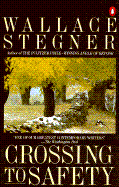
I don't know much about loss. I know what longing is, but with loss, I'm a novice. I've had a few grandparents pass away during my life, but no uncles, cousins or parents. A couple friends committed suicide within a couple of years of one another. I guess that's the closest to loss that I've come that has seriously affected me. But I didn't love them so the loss seems vacant almost. I was mad at them more than anything and I still am. Stll, this loss is death and I know it can take on any personality, any form. Loss is a shapeshifter.
For the first half of Wallace Stegner's Crossing to Safety I was fooled by the author into believing I was reading a striking book on common experiences. Stegner's narrator, Larry Morgan, was a writer teaching at a Wisconsin college when he and his wife Sally meet the two people that will irrevocably change their lives. I have heard of people's lives being changed by a dramatic or traumatic event-a death, a divorce, a winning lottery ticket, a failed exam. I never heard of of anybody's life but ours being changed by a dinner party.
A lifelong friendship is formed that night, the bonds of which are never broken. A truly remarkable 4-way relationship. But it's the unexpected event that takes place on a harmless camping trip that has kept me thinking and rethinking what love and loss mean. Sally is stricken with Polio. The jubilant 30-year old becomes reliant on crutches and braces for the rest of her life. That's in the late 1930's. This to me is like a loss of life. Not to Sally, or Larry for that matter. Without function of my body parts, how could I live the life I had? Could I live a different one, one that would be dictated by my ability to get around, slowly and painfully with crutches and braces? But Sally never seems to hesitate. As readers we aren't brought into the years of struggle she must have gone through. Instead, Stegner simply refers to it in passing a few times. She has a sick body, but a lively spirit type of thing.
Now in the 1970's, Larry and Sally are visiting the Lang's on their much beloved estate in Vermont. It's the last time all four will be together. And they know it. Charity Lang is dying of cancer and has called the Morgans there to have her entire family around. Planning her last breaths till the end, just like she planned and scheduled the rest of her life and everyone else around her.
It was her death. She had a right to handle it her own way. But I felt sorry for Sid, a reluctant stoic, and I dreaded the coming hour or two when I would be alone with him. I was the person he was most likely to confide in, and I feared his confidence and had on tap no word of consolation or comfort. It crossed my mind, while I sat waiting on the lawn above the green and blue view, that down under his anguish and panic he might even look forward to her death as a release. Then I decided not. Charity had mastered him, but also she supported him. She not only ran his life, she was his life. I didn't like to think what would happen to him with her gone. His resistance and resentment were only expressions of his dependence. Sally resented her crutches, too, but without them she would have been hardly more than a broken stick with eyes.
It's this eventual loss that I've yet to experience and I'm in no rush to witness. But it encompasses humanity in tow relationships between husbands and wives. Is this passing something any of us can prepare for? Don't we block this inevitability out of our minds, banish death to the darkness of our knowing? At least I try to.
At times Stegner scared me with his frankness...with the truth. It's uncharacteristic to read such things about love and life. It's all too real, a little to close for comfort, but Stegner steps over the boundary of conventional literature and christens the reader with the true word of truth.
